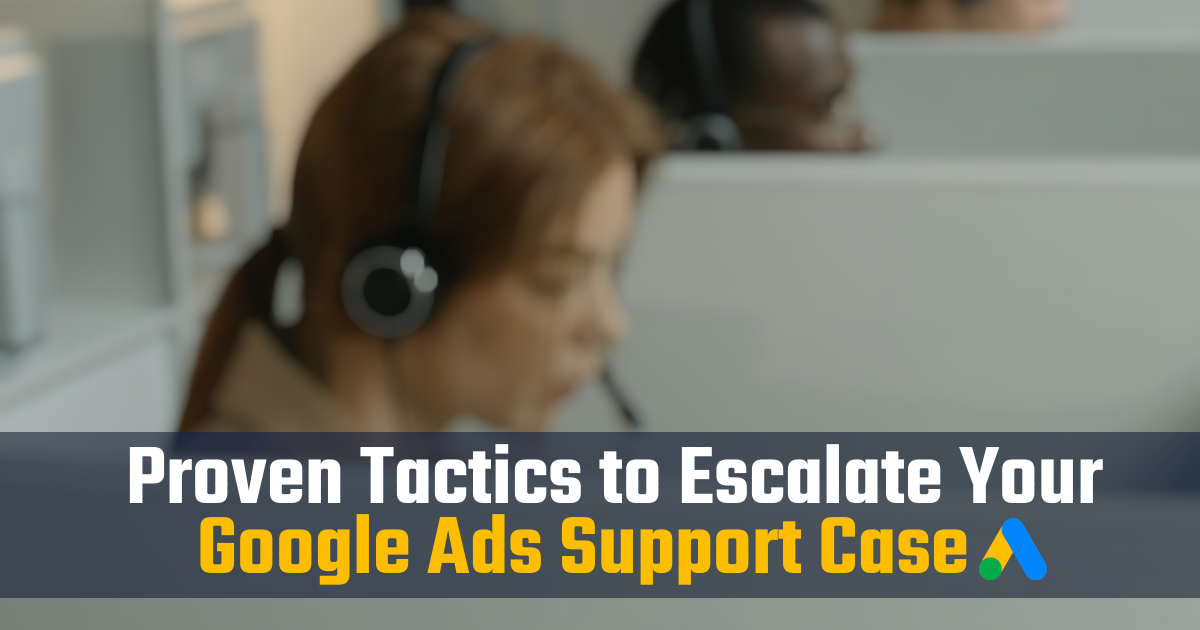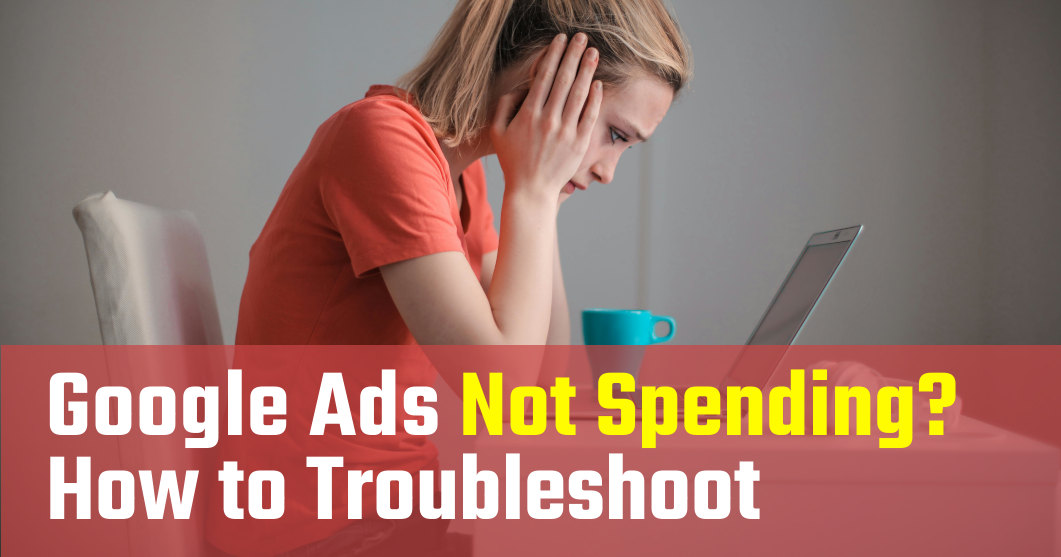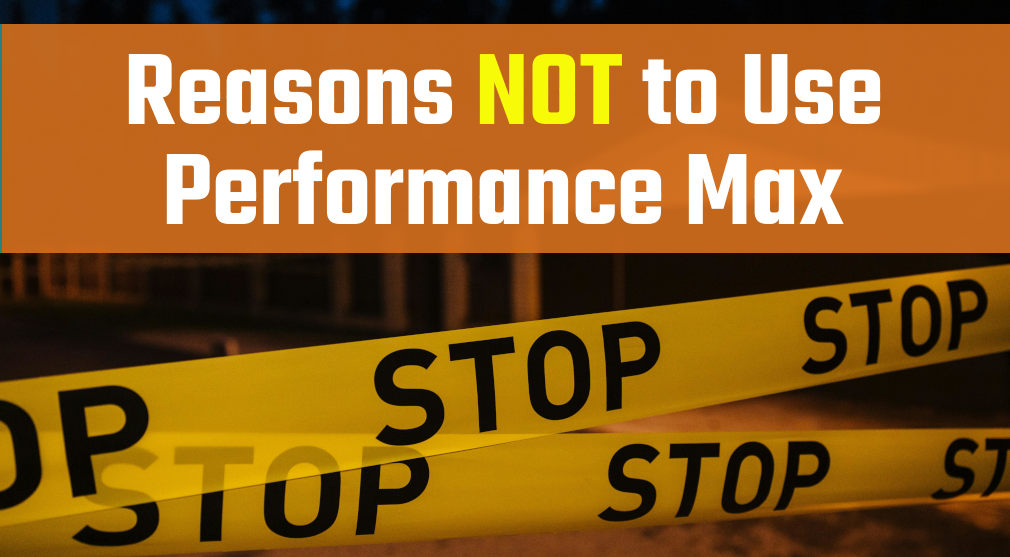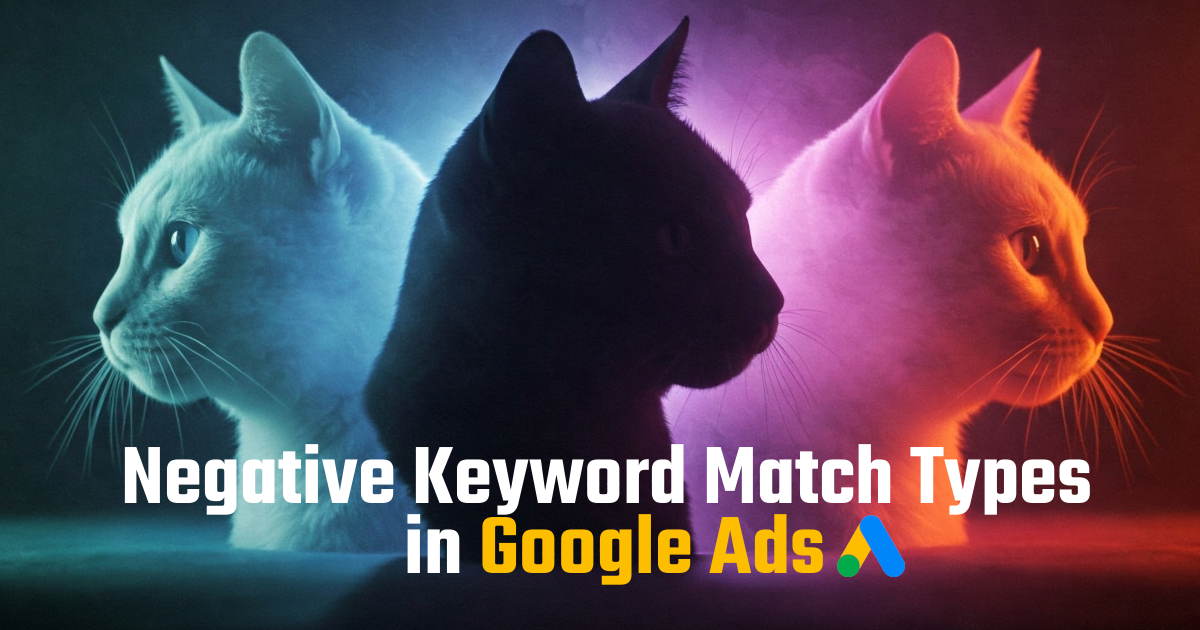Using Google ads is a great way for locksmiths to advertise their services locally, but the process for getting started can be surprisingly challenging.
To be permitted to run Google Ads for locksmiths, advertisers must first undergo Google’s rigorous Advanced Verification process.
Advanced Verification is not for the faint of heart.
Locksmith companies should expect to submit extensive documentation on their business, including licenses, state registrations, and photos, just to name a few.
If you’re a locksmith who is struggling to get verified by Google Ads, hang in there. With a little bit of patience (actually, a lot of patience) and some careful document gathering, you will get the verification you need to advertise in Google and grow your business.
Here’s what you need to know. (And if you need any help along the way, just let us know.)
Can locksmiths use Google Ads?
Yes. Locksmiths can use Google Ads to advertise their services, but they must first undergo Google’s Advanced Verification process. This process involves submitting documents to prove that the locksmith company is a legitimate, registered business in the United States or Canada.
If advertisers fail the Advanced Verification process, they will not be able to run Google Ads for locksmith services. Attempts to run ads will automatically be blocked, and attempts to bypass the requirements may lead to account suspension.
In fact, merely adding keywords related to locksmith services in Google Ads will result in a warning:
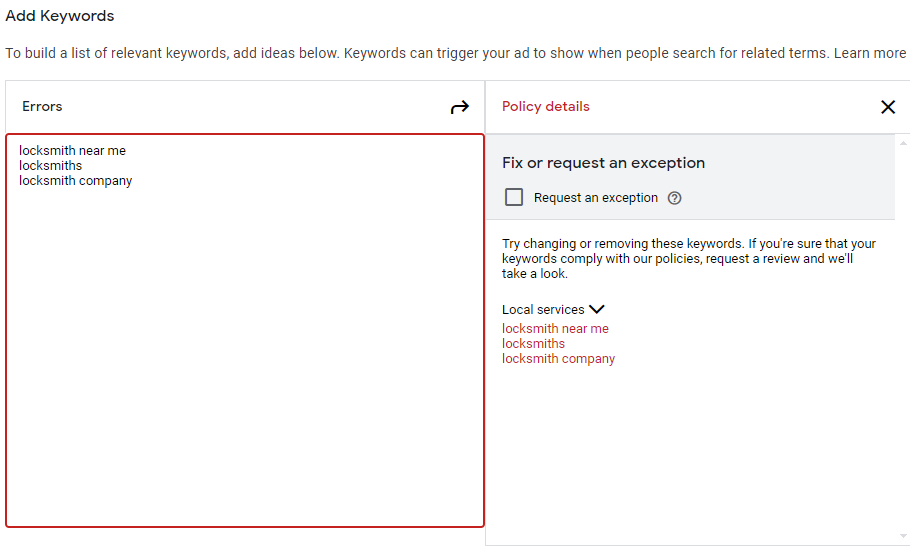
What is Advanced Verification in Google Ads?
Advanced Verification is a rigorous approval process within Google Ads that is required for certain advertisers to verify the legitimacy of their businesses. The process requires advertisers to submit an array of documents to prove that their businesses are established and credible.
Currently, there are only two types of companies that are required to undergo Advanced Verification in Google Ads:
- Locksmiths (USA and Canada)
- Garage Door Services (USA)
Google also refers to these types of businesses as “local services.”
For these companies, Advanced Verification can seem unnecessarily cruel and unfair. But ultimately, the goal is to prevent scams and sham advertisers from flooding Google Ads with fake and deceptive ads.
In Google’s words: “Google’s Advanced Verification policies help to reduce invalid activity and to ensure that local business ads are relevant, useful, and lead to a positive experience.”
(Note that Advanced Verification should not be confused with Advertiser Verification, which is a separate verification process for all advertisers using Google Ads, as we explain in the Frequently Asked Questions below.)
Why is Advanced Verification required to use Google Ads for locksmith services?
So, why are locksmiths singled out? What makes them different from any other business advertising in Google Search?
Google doesn’t explicitly say why locksmith services, specifically, face such strict requirements. When we recently tried to launch Google Ads for a locksmith company, we were surprised by how stringent the rules were.
Has anyone tried running @GoogleAds for a locksmith? Who knew it was so challenging!
— Mike Marlin Jr. 🤓 (@mikemarlinjr) February 16, 2024
Here's a short list of the docs that Google requires to verify the business 😅 ... #ppcchat #googleads #ppc 1/13
So, we did some digging into the reasons, and here’s what we found.
Laws for advertising locksmith services in search engines
Not long ago, ads for bad-faith locksmith companies were rampant in search engines like Google.
These ads were not run by legitimate, local locksmiths. Instead, they were lead-generation companies that advertised all over North America. They were middle-men, essentially. If you got locked out of your home or vehicle and searched for a locksmith in Google, you might click an ad for a seemingly “local” locksmith and call the phone number. But instead of a real locksmith, you got a call center that would sell your information to unlicensed contractors around the United States. These mock locksmiths would simply drill out the lock and then charge 3 to 4 times more than the rates promised by the call center. Meanwhile, if you’re locked out of your home, you would have no choice but to pay up.
A troubling problem gets worse
This Wild West of shady locksmith advertising got so bad that news organizations like the New York Times began to take notice.
In 2016, the Times covered this troubling locksmith ad scheme in an investigative piece titled “Fake Online Locksmiths May Be Out to Pick Your Pocket, Too.”
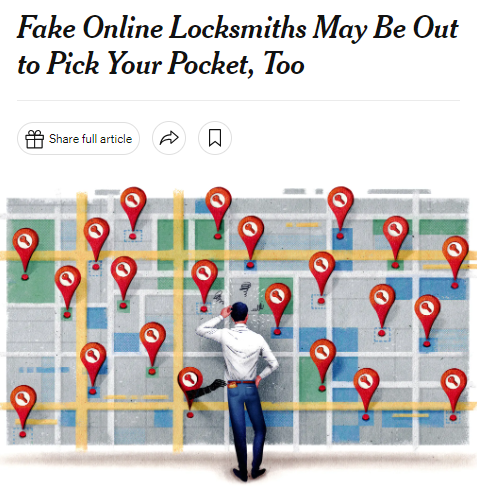
That’s when lawmakers took notice, too. And by the next year, Google announced that locksmiths would be added to its list of “restricted businesses” in Google Ads. To advertise, these companies would need to apply for Advanced Verification.
Further lawsuits ensued, pitting legitimate locksmiths against Google. These companies argued that Google’s policies and algorithms worked against legitimate locksmith businesses, forcing them to pay high costs for ad placement above scammy listings.
All of this helps to explain why the Advanced Verification process for locksmiths using Google Ads is such a mess.
So, let’s examine what that mess actually looks like …
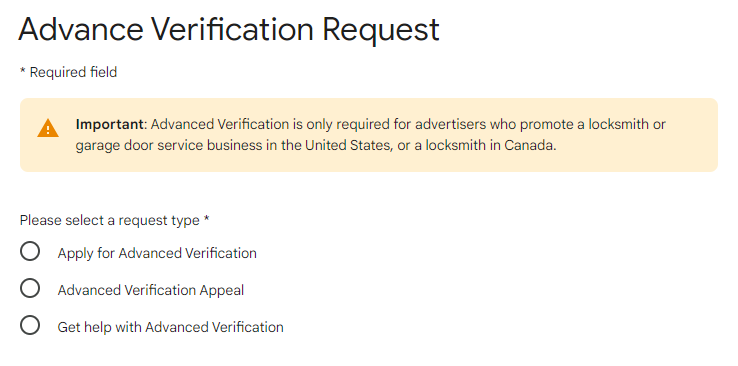
What are the requirements of Advanced Verification for locksmiths using Google Ads?
Advanced Verification for locksmiths can look different for different types of businesses (such as mobile-only locksmiths vs. those with in-store services like key copying, for example). But in our experience, the requirements usually require most or all of the following:
Business Information
- Full legal name of the business name
- Registered business address
- Full legal name of the business owner
- Google Ads Customer ID
- Email for business owner and/or Google Ads manager
- Type of locksmith services the business provides (Full-service locksmith or car lockouts only)
- Type of locksmith license (Locksmith license, Contractor license, Other, or no license)
- How long has the business been operating under its current name?
- How many storefronts or retail spaces (where customers can visit) does the business operate?
Business Documentation
- State-issued business registration document or certificate (In some cases, if the registration document is not immediately available, a screenshot of the business’s online state registry page may be accepted)
- Fictitious name registration document (if applicable)
Business Asset Photos and Images
- Image of branded business invoice (that would be provided to a customer)
- Image of branded business card (front and back)
- Image of business vehicle registration sticker/receipt/document (title not accepted)
- 5 images of the business vehicle (showing complete vehicle, wheels to roof):
- Left side of vehicle
- Right side of vehicle
- Rear side of vehicle (with license plate in view)
- Front of vehicle
- Close-up of license plate only
Business Location Images
- An image of the exterior of the business location clearly displaying the physical address number, including suite, office, or apartment number if applicable.
- If the registered business address is the owner’s home, submit an image of the exterior of the home clearly displaying the street number.
- A wider image displaying the entire building (If the business has a storefront, submit an image of the exterior of the storefront, including any signs that feature the business name.)
- Utility Bill: Submit a copy of the most recent utility bill from the last 3 months for the address registered to the business. Bank statements are not accepted. The following are acceptable utility bills: garbage collection, water, sewage, electricity, internet, gas.
Business Tools & Equipment Images
- Two or more separate images of tools and equipment that the business uses to complete typical jobs, next to a branded business card or branded invoice. (Images must also show the business card or invoice in the same photo, or they will not be accepted)
- Images of common tools, such as power drills, hammers, and similar hand tools will not meet Google’s requirements.
- Image of the business’s lock pick set and one other tool (if the business is a Full-service locksmith)
Video Verification
- Some locksmiths may be required to complete video verification to further establish the legitimacy of the business (especially if the business submit documents that do not meet Google’s verification standards)
- Video verification is typically completed through Google’s online portal, requiring businesses to record a 2- to 5-minute continuous video showing the exterior and interior business location and activity that establishes ownership, such as unlocking the front door or opening a cash register.
- This video must be continuous and recorded at the time of submission. There is no option to submit a previously recorded video.
Okay, now what?
As locksmiths submit the various documents, Google’s Advanced Verification team will typically respond with additional requests or questions. For example, if an address is not consistent across all documents, they may ask for clarification or an updated document.
(For one of our clients, the Advanced Verification team asked us to “elaborate on the business relationship between” two slightly different street addresses on various documents. The two addresses were different by one digit: i.e. 123 and 124.
This inconsistency was due to an older business location that was still owned by the advertiser and thus was still listed on some business documents, even though the property was no longer used by the business. But it was enough to raise flags for Google, at least initially.)
During back-and-forth communication, locksmiths might assume that their application for Advanced Verification is being reviewed in real time, throughout this whole process. But this is not the case. After all documents are submitted, the application moves onto the actual full review.
For our most recent client, it took 9 weeks for his application to be fully approved, due to a “high volume of applications” in their queue. This process also involved a good deal of back-and-forth communication and friendly check-ins with Google’s Advanced Verification team.
If a locksmith’s application is denied, advertisers can request an appeal.
So, what’s our take on all this?
As experienced Google Ads managers, we’ve encountered a lot of interesting challenges and requirements for advertisers over the past two decades. But the Advanced Verification process for locksmiths is unlike anything we’ve seen before.
On one hand, we understand the need to verify locksmith businesses to keep sham companies out of Google Ads. (That benefits everyone.) We also understand that Google is covering its rear against the risk of lawsuit. They don’t want legal liability for allowing scam online locksmith ads to proliferate on its ad network. That’s why the Advanced Verification is so intensive.
But on the other hand, these requirements are a little weird, right?
They were clearly created with good intentions, but they are removed from the reality of today’s small businesses.
Challenges for small locksmith businesses
Many legitimate locksmith companies (especially small, one-person businesses, which are common in this industry) will not be able to easily compile all this documentation in a way that satisfies Google’s Advanced Verification team.
Additionally, the requirements don’t really account for the fact that most businesses are not static entities that never change once they are formed. Businesses change locations, services offered, vehicles, business structure (LLC for S Corp, for example) and so on. These changes are not always filed with the Secretary of State. Is that because the businesses are shady? Of course not. It’s because they’re busy. They’re doing the day-to-day grind, serving customers and trying to keep their businesses afloat.
Meanwhile, all it takes is one little inconsistency in the submitted documents for these locksmiths to fail the Advanced Verification.
Also, “business cards”? Really? That requirement is especially strange. Physical business cards are becoming increasingly rare, even for service-based businesses like locksmith companies. So it’s not clear why those are requested as a form of verification. Also, why is it necessary to submit images of the “front and back” of the business cards? Why photos of every side of the vehicle?
It’s all just a little much.
Sympathy for Google’s Advanced Verification Team
Again, we completely understand the good intentions behind the Advanced Verification process – even if we don’t love this process. Similarly, we also understand that the people who administer this process are simply doing their jobs.
It’s unclear if Google handles Advanced Verification internally or if it’s outsourced (or possibly a combination). But these teams are clearly required to follow rigorous protocols just as applicants must. In many cases, it’s likely that these individuals can deduce right away whether they’re dealing with a legitimate locksmith company or not. But they must follow the rules to a T and check every box.
So, while it’s understandable for business owners to be frustrated by this process, we always stress the importance of being patient and respectful to Google’s verification teams. This process is already difficult as it is. Nobody wants to make it any worse.
So, eyes on the prize …
Benefits of using Google Ads for locksmiths
If you can survive the intense verification process, there are several benefits to gain from using Google Ads to advertise your locksmith services.
Here are main advantages:
- Keyword targeting: You can show your ads to people who are actively searching for your locksmith services, right at that moment. This is a high conversion-rate niche in Google Ads.
- Location targeting: Easily target your local area by zip code, specific counties, towns, cities or a with radius from your business location.
- Cost control and efficiency: Google Ads is one of the most cost-effective forms of advertising. You only pay for ad clicks and you have full control over your ad budget.
Conclusion
Before using Google Ads for locksmith services, an advertiser must first receive Advanced Verification from Google. This is a comprehensive review that requires locksmiths to submit substantial documentation to establish the legitimacy of their business. However, locksmiths who successfully complete this process can strongly benefit from using Google Ads to advertise and grow their businesses.
Frequently Asked Questions (FAQ)
1) Can locksmiths advertise on Google?
Yes, locksmiths can advertise on Google, but they must first receive approval through an extensive Advanced Verification process. This process involves submitting a variety of documents to prove that the locksmith runs a legitimate, credible business.
2) How do I advertise my locksmith business?
Locksmiths can advertise their business online with Google Ads. This allows them to place sponsored ads in search engines, which appear when local customers search for their services. Locksmiths must first receive Advanced Verification before being able to advertise in Google.
3) What’s the difference between Advanced Verification and Advertiser Verification?
In Google Ads, Advertiser Verification is a process that all advertisers must complete to verify their business identity. Advanced Verification is a more extensive review process for specific businesses, such as locksmiths, to confirm that they are established, credible companies.
4) How much does Google Ads cost for locksmiths?
The cost for ad clicks in Google Ads varies based on numerous factors, including competition from other advertisers. In the United States, clicks for locksmith keywords can cost between $2 to $18 each. Additional costs can include ad management fees, if locksmiths choose to have their ads managed by a specialist.
Need help with Google Ads for your locksmith business?
If you need help running Google Ads for your locksmith company or receiving Advanced Verification, contact our search professionals at MarlinSEM. Mike Marlin and his team can help you submit the required documentation and communicate with Google on your behalf. We work for YOU, not Google. Our job to help you grow your locksmith business with Google Ads.
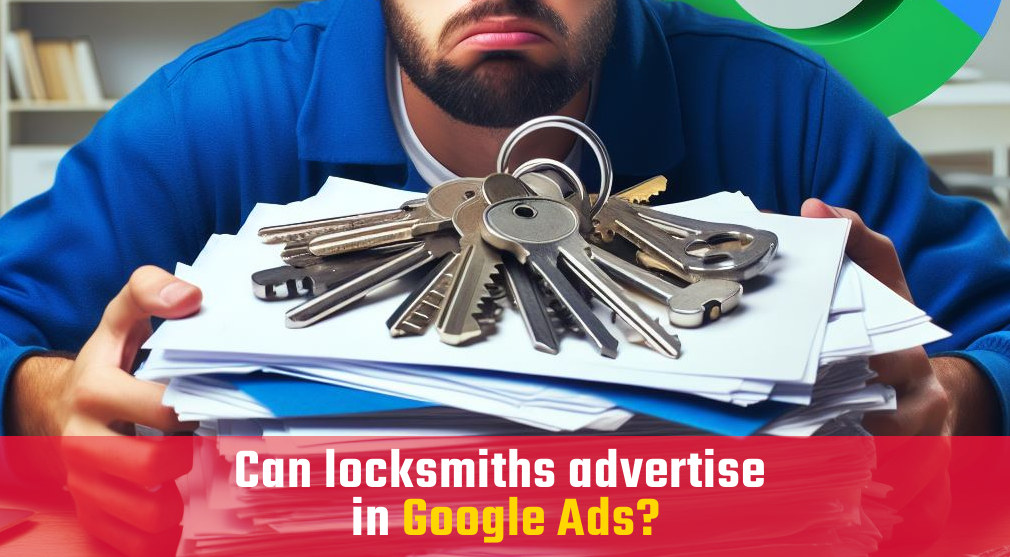
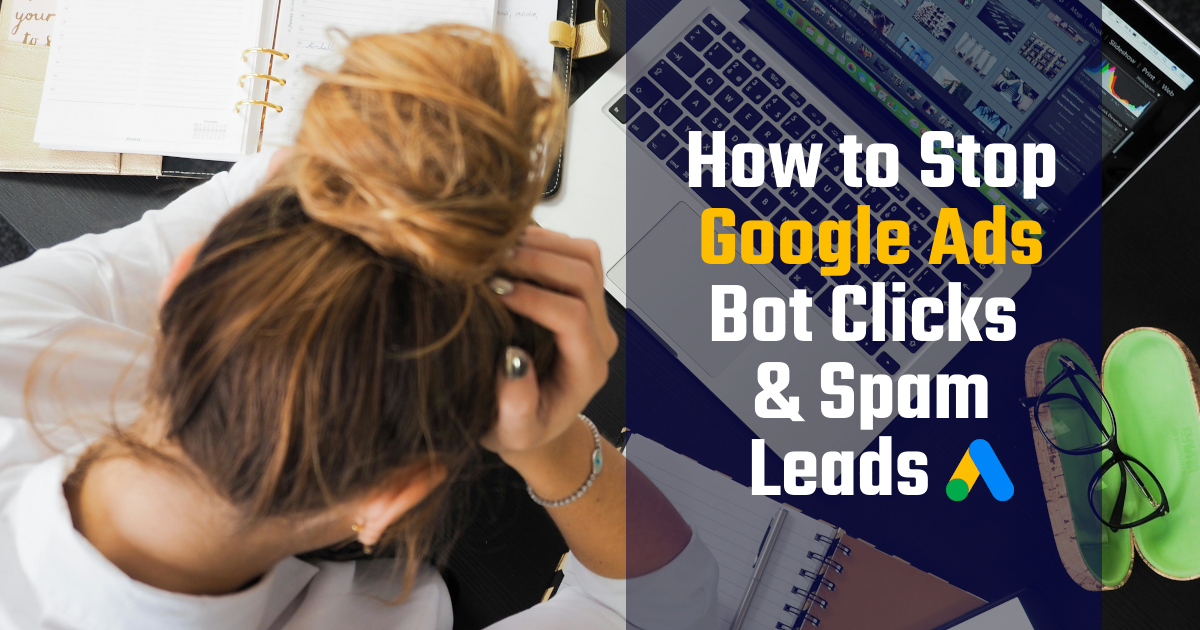
![How to Use Google Ads for Limo Services [Updated 2025]](https://marlinsem.com/wp-content/uploads/2024/01/limo-company-advertising-google-ads-2025.png)
